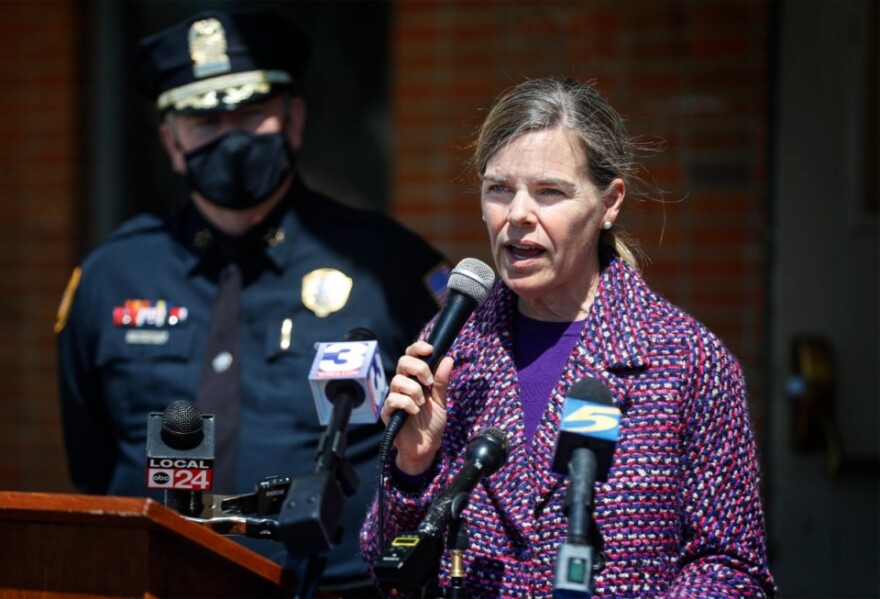Last summer, Shelby County's District Attorney Amy Weirich assigned a team of five prosecutors to start looking into the excessive force complaints leveled against officers in the Memphis Police Department. The Conduct Review Team (CRT) has already filed misconduct charges against two officers.
Investigative journalist Marc Perrusquia with the University of Memphis' Institute for Public Service Reporting talks about some of the policy changes -- and lawsuits -- that have contributed to officials taking a closer look at misconduct complaints.
This is a lightly edited version of the audio conversation above.
Q: In the past, these complaints were handled internally at MPD. What changed and why?
Marc: Well, Christopher, they still are handled internally. What's changed is there now is some outside oversight in the form of when the MPD in their internal investigations of police brutality find that there is merit to that allegation (i.e. charges have been sustained or found credible), then MPD is now forwarding those findings to the District Attorney. And the District Attorney is reviewing them through the CRT to determine whether or not they should file criminal charges. But it's largely the referral from the MPD that's what is different here now.
Q: And why did that change?
A: Well, it changed because of our reporting. We -- me and others -- put enough pressure in the aftermath of George Floyd being murdered in Minneapolis last year. We wrote numbers of stories about what the MPD was doing. And what I found... over and over and over again, police would find that an officer had violated the department's rules against use of force, but they would merely look at it as a violation of policy. And arguably, these cases often involved acts of torture.
Q: So when you have a group of attorneys (CRT) who work for county government reviewing use of force cases -- you know, taking a look at bodycam videos and talking to victims, are they able to demand more answers or accountability where, maybe, citizen review groups like the Citizen Law Enforcement Review Board (CLERB) have fallen short?
A: For most of these cases [CRT] isn't going to get any more satisfaction for anyone because they're looking through the narrow view of "did the officer's conduct violate criminal laws?" That's going to be a minority of cases, so to the extent when officers are charged criminally -- and it has happened twice -- they will provide more accountibility in those situations. But they are not designed to re-investigate the administrative investigation.
Q: You've been digging into these misconduct complaints for the past year, and you even got to the point where you sued the City of Memphis because of all the blocks and barriers to getting what is essentially public information. Last week you dropped the lawsuit. What happened?
A: We dropped it for two reasons. One, I got what I wanted... hours of bodycam footage showing an MPD officer in a series of incidents where he was using his taser against citizens in a way that internal investigators found had violated MPD's use of force policy. MPD at one point wanted $2,400 for this footage and in agreement to settle it I got it at no costs. My lawyer services were pro bono from the Reporters Committee for Freedom of the Press. None of this cost me or the Institute a red cent which is good for public policy because it empowers the media to bring these very vital freedom of information actions which are needed to keep government honest. Also we dropped it because after I sued, MPD changed its policy. They are now referring all of these findings of excessive force to the DA. Attorneys at the Reporters Committee felt we could no longer argue that these cases wouldn't be reviewed criminally, and so we just agreed to drop it.
Q: So in the future are they just going to be handing over bodycam video without any complaints or fees. Did you win greater access to this information?
A: There are still plenty of battles to be fought. They aren't going to hand them over wholesale, but one of the values of a public records lawsuit is it's kind of like a shot across the bow. It keeps the government honest; they know we're not just going to sit back -- the cash-starved media that doesn't have money anymore to bring these suits -- that's not us. When we feel it's in the public interest, we're going to be bringing more of these freedom of information actions. The people in the government know that. They're on notice. So yes, I think we're going to get greater transparency and accountibility because of it.
Q: MPD is about to get a new police chief. Are you and other members of the media optimistic that the policies will be more transparent under her leadership?
A: I think there's a great window of opportunity here... It certainly changes the dynamic over there where time and time again MPD refused to comment, refused to cooperate in these investigations. And we'll see. I think there's a chance for them to change their tune. We're seeing some of that already.



